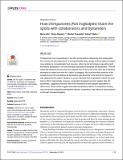How chimpanzees (Pan troglodytes) share the spoils with collaborators and bystanders
Abstract
Chimpanzees hunt cooperatively in the wild, but the factors influencing food sharing after the hunt are not well understood. In an experimental study, groups of three captive chimpanzees obtained a monopolizable food resource, either via two individuals cooperating (with the third as bystander) or via one individual acting alone alongside two bystanders. The individual that obtained the resource first retained most of the food but the other two individuals attempted to obtain food from the "captor" by begging. We found the main predictor of the overall amount of food obtained by bystanders was proximity to the food at the moment it was obtained by the captor. Whether or not an individual had cooperated to obtain the food had no effect. Interestingly, however, cooperators begged more from captors than did bystanders, suggesting that they were more motivated or had a greater expectation to obtain food. These results suggest that while chimpanzee captors in cooperative hunting may not reward cooperative participation directly, cooperators may influence sharing behavior through increased begging.
Citation
John , M , Duguid , S , Tomasello , M & Melis , A P 2019 , ' How chimpanzees (Pan troglodytes) share the spoils with collaborators and bystanders ' , PLoS ONE , vol. 14 , no. 9 , e0222795 . https://doi.org/10.1371/journal.pone.0222795
Publication
PLoS ONE
Status
Peer reviewed
ISSN
1932-6203Type
Journal article
Description
The study was funded by the Max Planck Society. S. Duguid wrote the manuscript supported by a grant awarded to A. P. Melis from the Templeton World Charity Foundation (TWCF0264).Collections
Items in the St Andrews Research Repository are protected by copyright, with all rights reserved, unless otherwise indicated.

